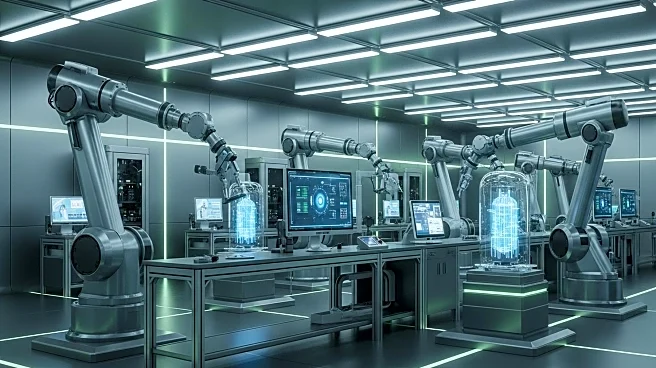What's Happening?
Drug manufacturers are increasingly integrating artificial intelligence (AI) into their production processes to improve efficiency and sustainability. Companies like Sanofi and Biogen are utilizing AI to optimize end-to-end production lines, aiming for fully automated operations. Sanofi is leveraging AI to anticipate and mitigate quality and compliance risks, while also fortifying its supply chain to adapt in real-time to changes in demand or disruptions. Moderna is focusing on real-time monitoring of anomalies to enable rapid responses. The industry is moving from using AI for distinct activities to overseeing entire production processes, indicating a significant shift in ambitions.
Why It's Important?
The integration of AI in drug manufacturing is crucial for enhancing production efficiency and sustainability. By optimizing processes, companies can reduce costs, improve quality, and minimize environmental impact. AI-driven supply chains can adapt to market changes, reducing the risk of shortages and ensuring consistent product availability. The use of AI in real-time monitoring and decision support can lead to faster responses to operational deviations, improving overall reliability. As AI becomes more integral, companies must also address potential risks such as system failures and cybersecurity threats, balancing innovation with security.
What's Next?
Drug manufacturers are expected to continue expanding AI applications across their operations, with a focus on achieving fully automated production processes. Companies will likely invest in AI-driven technologies to enhance supply chain adaptability and sustainability efforts. Collaboration with technology providers and research institutions may accelerate advancements in AI and robotics integration. As AI becomes more prevalent, regulatory frameworks may evolve to address new challenges and ensure safe implementation. Stakeholders will need to monitor developments closely to capitalize on opportunities while mitigating risks.
Beyond the Headlines
The growing use of AI in drug manufacturing raises ethical and legal considerations, particularly regarding data privacy and security. Companies must ensure compliance with regulations while leveraging AI for competitive advantage. The shift towards automation may impact workforce dynamics, necessitating retraining and skill development for employees. Long-term, AI could transform the industry, leading to more personalized and efficient healthcare solutions. The balance between technological advancement and human oversight will be critical in achieving optimal outcomes.











